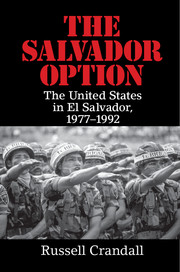Book contents
- Frontmatter
- Dedication
- Epigraph
- Contents
- List of Figures
- List of Organizations
- Acknowledgments
- 1 Introduction
- PART ONE EL SALVADOR IN THE COLD WAR
- PART TWO JIMMY CARTER
- PART THREE RONALD REAGAN
- 19 Reagan Arrives
- 20 Reagan and Salvador
- 21 El Mozote
- 22 Another Vietnam
- 23 Solidarity
- 24 Troop Cap and Certifying Human Rights
- 25 Reagan Gambles on Elections, 1982
- 26 The Shultz Doctrine
- 27 Human Rights
- 28 Henry Kissinger
- 29 Contras
- 30 “Elections Yes, Dialogue No,” 1984 Presidential Election
- 31 La Palma
- 32 Esquipulas
- 33 Counterinsurgency I
- 34 Counterinsurgency II
- 35 Zona Rosa
- 36 Air War
- 37 José Napoleón Duarte
- 38 Iran-Contra
- PART FOUR GEORGE H. W. BUSH
- PART FIVE POSTWAR
- Notes
- Bibliography
- Index
28 - Henry Kissinger
from PART THREE - RONALD REAGAN
Published online by Cambridge University Press: 05 June 2016
- Frontmatter
- Dedication
- Epigraph
- Contents
- List of Figures
- List of Organizations
- Acknowledgments
- 1 Introduction
- PART ONE EL SALVADOR IN THE COLD WAR
- PART TWO JIMMY CARTER
- PART THREE RONALD REAGAN
- 19 Reagan Arrives
- 20 Reagan and Salvador
- 21 El Mozote
- 22 Another Vietnam
- 23 Solidarity
- 24 Troop Cap and Certifying Human Rights
- 25 Reagan Gambles on Elections, 1982
- 26 The Shultz Doctrine
- 27 Human Rights
- 28 Henry Kissinger
- 29 Contras
- 30 “Elections Yes, Dialogue No,” 1984 Presidential Election
- 31 La Palma
- 32 Esquipulas
- 33 Counterinsurgency I
- 34 Counterinsurgency II
- 35 Zona Rosa
- 36 Air War
- 37 José Napoleón Duarte
- 38 Iran-Contra
- PART FOUR GEORGE H. W. BUSH
- PART FIVE POSTWAR
- Notes
- Bibliography
- Index
Summary
If the reaction to the Kissinger report on Central America quickly bogs down into the Washington political community arguing over things like El Salvador's willingness to hand in human-rights reports to its headmasters in Congress, you might as well take that $8 billion aid package the commission is proposing and drop it from a plane over the Caribbean Sea.
– Wall Street Journal, January 12, 1984Kissinger is not a consensus-builder…he's a lightning rod.
– Anonymous White House aide, January 15, 1984“Strong and Legitimate Social and Political Order”
U.S. engagement in El Salvador was predicated on the awareness that Salvadoran society was one of the “sickest and most repressive” in the region. As a retrospective study noted, U.S. military advisors, diplomats, and policymakers needed to both professionalize the Salvadoran armed forces to wear down the guerrillas and strengthen democracy “so as to weaken the rebels’ claim to political legitimacy.” The approach got a big political boost on January 10, 1984, with the publication of the Report of the National Bipartisan Commission on Central America, soon called the Kissinger Report because former Secretary of State Henry Kissinger was chairman.
Pleasing to critics of U.S. policies, the report recognized that poverty, injustice, and a closed political system were key factors that had led Salvadorans to take up arms. It added, though, that these domestic causes had been taken advantage of by external forces. Thus, what was at stake was not simply El Salvador's future, but in an echo of American presidents throughout the Cold War, “our [U.S.] credibility world-wide.…The triumph of hostile forces in what the Soviets call the ‘strategic rear’ of the United States would be read as a sign of impotence.”
What was necessary, therefore, was for the United States to see the effort through, even though progress to date had been disappointing and government abuses were still prevalent. The commission described the war as presently “stalemated,” a condition that favored the FMLN. To remedy the situation, the commission recommended “sizeable levels of military aid as quickly as possible” for better training, mobility, and firepower.
- Type
- Chapter
- Information
- The Salvador OptionThe United States in El Salvador, 1977–1992, pp. 300 - 305Publisher: Cambridge University PressPrint publication year: 2016

